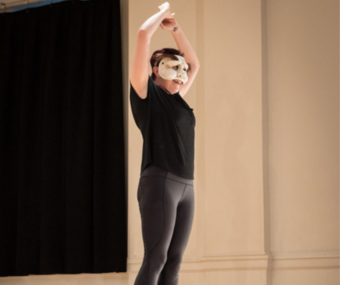Memorizing Lines
The Forgotten Fundamental
Over the course of my freelance directing and teaching career, I have observed a troubling trend. The professional actors I direct, and the undergraduates I teach, are having an increasingly difficult time remembering their lines. Some, alarmingly so. When I encountered this initially, I sloughed it off as something particular to that actor, style of material, or time constraints. I made lots of excuses. But with each occurrence, over many years, actors’ inability to memorize has become harder and harder to ignore.
Several years ago, I became so passionate about this issue that I decided to begin researching and developing strategies for helping actors train and improve their own memories. I was surprised to discover that although there exists a lot of information out there related to the process of remembering, there is virtually no research regarding its implications for actors or acting.
“How to Remember” has been an exciting project, and one that I feel is critical for the development of acting and the larger field of performing arts in the future. Especially as digital innovation continues to grow at exponential rates.
Recently, I conducted a survey of undergraduate theater majors at 19 universities across the country. I had two goals for this survey: First, I wanted to discover how students were actually approaching memorization and compare that to the proven principles and methods I had learned throughout my memory research. Second, I wanted to learn what limited or blocked those students from being able to do remember effectively and begin to generate proactive strategies. The survey was comprised of two simple questions:
1. What different methods do you use to remember your lines?
2. What are the main challenges, blocks, struggles you face when memorizing lines?
The questions were intentionally “non-leading” in nature, and I included no multiple choice answers or suggestions of any kind. Just two questions, with an empty box after each for them to respond.
The surveys were delivered to department heads of undergraduate theater programs, who would then send students an email invitation with a link to participate in the survey on my website. Students could choose to participate anonymously or not. Responses were collected over a four-month period, then interpreted and organized into a spreadsheet.
Of the responses collected, here were some of the most interesting revelations (and for those of you who want to see the complete results, follow this link here):
The #1 memorization method student actors reported using was rote memorization.
Rote memorization received 42 percent of the responses and was almost four times more popular than the second method. Working with a partner (11 percent) and writing it out/using flashcards (8 percent) were the second and third most popular answers, respectively. Also of interest: rote memorization was the number one choice across all 19 schools. No exceptions.
Only 7 percent of actors reported using Script/Character Analysis to aid their memory.
Recent studies (most notably those conducted by Helga and Tony Noice) confirm that an actor’s memory is aided by an understanding of the intentions and objectives of his/her character. Surely more than 7 percent of student actors analyze their scripts for intentions/beats/objectives. So why is this number so low? I suspect it’s because many student actors look at script/character analysis as something different or separate from the memorization process. If this is true, actors would greatly benefit from the knowledge that their character work will not only deepen their understanding of the role, but will also help them remember their lines.
Not one actor reported using mnemonics.
Mnemonics, which is a fancy word meaning “memory aid,” greatly benefitted orators and actors in previous centuries, yet they are ignored in contemporary actor training programs. Intentions, objectives, and movement/choreo are great tools in helping actors remember their lines in naturalistic and linear drama. But what happens when an actor is cast in a role in an avant-garde or experimental role? Or they have to memorize a long list? Or the role requires complete stillness, with no blocking as a “trigger?” What if there’s no rehearsal time? We need to give actors more tools that will enable them to proactively meet the demands of any situation they encounter on the stage. They need to be taught what I call “situational acting.” And mnemonics can help.
Student actors are dealing with a lot of stress.
The student actors reported 19 different challenges or blocks to their ability to memorize. The top three responses (time, stress, distractions) were only separated by 10 percentage points, but accounted for 49 percent of total responses.
Taken together, these numbers tell me that student actors overwhelmingly may use the same handful of methods to memorize, but the blocks they encounter can be varied and diverse. Not surprisingly, it’s also clear that they are dealing with stress, pressure, and an inability to focus. Another note of interest: all 19 schools answered either “lack of time” or “stress/anxiety/pressure” as their number one reason. No exceptions.
Admittedly, this was a very simple survey. However, it’s very clear that student actors can benefit from strategies helping them manage time, reduce stress, limit distractions, and connect more deeply to text.
These include mnemonic tools such as the link, story, and loci methods, as well as developing skills of association, organization, attention, and direct feedback. These systems or strategies aren’t new. Some of them are as old as 2,500 years. They’ve just been forgotten.
In my own work, I’ve witnessed actors (both student and professional) dramatically improve their memorization skills through the use of a variety of simple principles and strategies readily available in the public domain. These include mnemonic tools such as the link, story, and loci methods, as well as developing skills of association, organization, attention, and direct feedback. These systems or strategies aren’t new. Some of them are as old as 2,500 years. They’ve just been forgotten. We must educate and train teachers and directors how to impart these strategies to their students. Strategies can include specific “systems” as I mention above, but student actors can, and should, be developing fluency with skills such as association, organization, attention, and direct feedback, among others. In my experience, once a student discovers the principles upon which their memory works, their approach to memorization becomes proactive and strategic, rather than reactive and fearful. Along with this understanding comes confidence. And for many, the process of memorization can actually become, dare I say, fun.
We also must work hard to overcome the stigma that training the actor’s memory somehow blocks the organic, creative process. I have encountered a lot of excitement about this work, but I’ve also experienced a fair amount of skepticism. I make sure to stress two things in my memory workshops: first, there is no single “magic formula” to memorizing everything. Every script is different, and every actor’s relationship to their text is unique. Second, this is memory training, not an acting method. The goal of this work is to build a strong textual foundation on which to build and develop the deeper meaning of the character.
Memorization is the fundamental skill all actors must perfect, no matter the culture, language, or aesthetic. Yet it’s not taught. Why?











Comments
The article is just the start of the conversation—we want to know what you think about this subject, too! HowlRound is a space for knowledge-sharing, and we welcome spirited, thoughtful, and on-topic dialogue. Find our full comments policy here
Interesting that this is almost never discussed. Thanks for bringing it up. Only once in my producing career was I forced to fire two actors who COULD NOT get off book for a Mamet play (American Buffalo.) A week before scheduled opening we had to start over with new actors (Reg E. Cathey and Paul Butler - both brilliant.) AEA insisted I pay the two weeks for the two who couldn't learn their lines. I pushed back, asking, "isn't there some basic obligation and expectation that the actor will fulfill the most basic requirement of the job?" Apparently not, Equity wise.
As an actor, my dyslexia has always forced me to be off book asap because I have difficulty keeping track of my lines on the page. And while it makes it difficult to do cold readings for auditions, I've always found that I'm much better prepared in rehearsals to start developing my character because I'm not as tethered to the script - I have the full use of my body. This is an important discussion and one that is at the very core of theater; without memorization there is no theater.
I'm thrilled to see someone is applying so much effort of thought to this aspect of our craft. I've long suspected my obsession with deeply embodying the language I'm hired to perform wasn't just my OCD, but rather (as you so eloquently explain on How To Remember) a desire to "dominate the text". And I've had a few challenging opportunities to do so. (Godot and Rosencrantz come to mind in particular.)
I'll be following the discussion on your site.
Thanks so much, Scot. Glad to see it resonated with you so deeply.